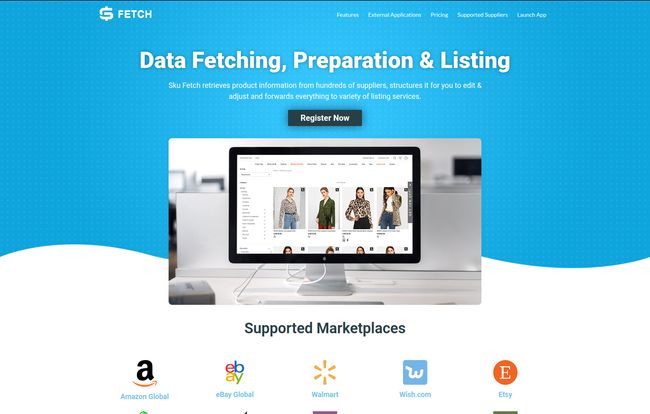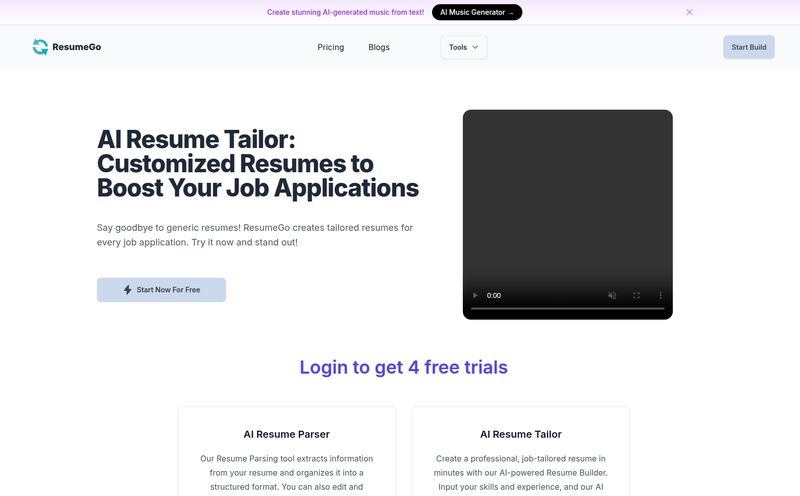I’ve been in the SEO and e-commerce game for what feels like a lifetime. I’ve seen trends come and go, platforms rise and fall, and I’ve spent more late nights manually uploading product listings than I’d care to admit. You know the drill: copy, paste, tweak the title, rewrite the description, download the image, re-upload the image... repeat a hundred times. It’s a soul-crushing, carpal-tunnel-inducing grind.
So, whenever a tool pops up promising to automate that whole mess, my ears perk up. But I’m also a skeptic. We’ve all been burned by clunky software that promises the world and delivers a headache. Recently, I’ve been hearing a lot of chatter about Sku Fetch, so I decided to roll up my sleeves and see if it’s another flash in the pan or the real deal.
So, What Exactly Is Sku Fetch?
Let's get straight to it. Sku Fetch isn’t trying to be your all-in-one e-commerce platform. It knows its job and focuses on doing it well. Think of it as a specialized “sous chef” for your online store. Its main gig is to go out to a supplier’s website (and we'll talk about just how many suppliers in a minute), grab all the product information—title, description, images, specs, you name it—and then prep it all for you to list on marketplaces like Amazon, eBay, Shopify, and others.
It’s a data fetching and preparation service. But where it gets interesting is the 'preparation' part. It’s not just a dumb scraper. It uses AI to actually improve the listings it fetches, which, as a content guy, definitely caught my attention.
The AI-Powered Features That Stood Out
Alright, let's get into the nitty-gritty. A tool is only as good as its features, and Sku Fetch has a pretty long list. But a few things really jumped out at me.
That Massive Supplier List is Kinda Wild
Okay, this is the first thing you notice. Sku Fetch claims to support over 600 suppliers. I had to read that twice. We’re talking about everything from the big dogs like Walmart and Home Depot to all sorts of niche wholesale and retail sites. For anyone in the dropshipping or arbitrage game, this is huge. It breaks you out of the 'everyone is sourcing from AliExpress' box and opens up a ton of possibilities for finding unique, profitable products that your competition might overlook. A huge list doesn't always mean quality, but the sheer breadth here is impressive.
AI That Actually Does Something Useful
The term “AI” gets thrown around so much these days it’s almost lost its meaning. But the OpenAI integration in Sku Fetch seems genuinely practical. It can take a bland, generic manufacturer's description and rewrite it, expand on it, or summarize it. This is a game-changer for SEO. You can instantly create more unique, engaging copy that helps you stand out, not just from other sellers, but in search results too. It even helps with titles, which is fantastic for optimizing your products for how people actually search. It’s like having a junior copywriter on staff, ready to go 24/7.
More Than Just Fetching Data
Beyond the core fetch-and-prep function, there are some other nifty tools baked in that show they understand a seller's workflow.
- Expert Item Finder: A tool that helps you find profitable items to sell. I’m always wary of these “magic bullet” finders, but it's a nice addition for generating ideas.
- Competition Finder: This lets you see who else is selling the same item. Super useful for pricing strategy and figuring out how to differentiate your listing.
- Bundles Creation: The ability to create bundles from different products is a great way to increase average order value. Doing this manually can be a real pain, so having a tool to help is a big plus.
- CDN Hosting: This is a sneaky-good feature. It hosts your product images on a Content Delivery Network. What that means for you is faster-loading images, which is not only better for user experience but also a known ranking factor for both Google and marketplace search algorithms. Slow images lose sales. Period.
How Sku Fetch Plays With Your Existing Tools
One of my biggest pet peeves is a tool that forces you to change your entire workflow. I’ve got my system, you know? Thankfully, Sku Fetch seems to get this. It’s built to be a part of your process, not the whole thing. It integrates with a bunch of different marketplace listers, so once you’ve prepped your items in Sku Fetch, you can push them out through the lister you already use. It’s also compatible with Sku Grid, a popular repricer and stock monitor, which is a critical piece of teh puzzle for any serious seller.
This compatibility is what makes it powerful. It’s not a closed garden. It’s a tool that connects to other tools, letting you build a custom stack that works for you. It's the difference between buying a pre-fab shed and getting a set of high-quality power tools to build your own custom workshop.

Visit Sku Fetch
The Good, The Bad, and The "Coming Soon"
No tool is perfect, and it wouldn't be an honest review if I didn't point out some of the potential downsides. The standout Pro is definitely the massive supplier support and the practical AI features. The ability to quickly generate unique descriptions across hundreds of potential product sources is a massive time-saver.
On the flip side, the pricing model might give some people pause. From what I can gather, it's based on the number of items you process each month. For a small seller just starting out, this is great—you only pay for what you use. But for a high-volume power seller processing thousands of SKUs, the costs could add up quickly compared to a flat-rate subscription. You'll want to do the math for your own business.
I also noticed that some repricer integrations, like for DSM Tools, are listed as “coming soon.” That’s a bit of a yellow flag for me. “Coming soon” in the software world can mean next week or next year. And finally, like any powerful tool, there's probably a bit of a learning curve. The interface seems straightforward enough, but with so many features, you should expect to spend some time getting everything set up just right.
A Quick Word On Pricing
As I mentioned, the pricing isn't a simple flat monthly fee. It's based on processing volume. Unfortunately, at the time of writing, there wasn't a clear, public pricing table on their main landing page, which is a personal pet peeve of mine. You'll likely need to sign up or dig into their app to see the specific tiers. I always prefer transparency, but the pay-as-you-go model itself is a valid approach that many will appreciate.
FAQs About Sku Fetch
What is Sku Fetch used for?
Sku Fetch is primarily used by e-commerce sellers to automatically pull product information (like titles, images, descriptions) from over 600 wholesale and retail suppliers. It then helps prepare and optimize that information before you list it on marketplaces like Amazon, eBay, and Shopify.
How many suppliers does Sku Fetch support?
It supports a massive list of over 600 suppliers, ranging from major retailers to smaller, niche-specific websites. This is one of its biggest selling points.
Does Sku Fetch work with Amazon and eBay?
Yes. It's designed to prepare listings for major marketplaces, including Amazon, eBay, Shopify, Walmart, Newegg, and even Facebook Marketplace.
Is Sku Fetch good for beginners?
It can be. The pay-per-item model can be cost-effective for beginners. However, there may be a learning curve to get the hang of all the features and integrate it into your workflow. It's powerful, which sometimes means it's not super simple.
What's the pricing model for Sku Fetch?
Sku Fetch uses a volume-based pricing model. This means you pay based on the number of products you fetch and process through the system each month, rather than a single flat fee.
My Final Verdict on Sku Fetch
So, is Sku Fetch the magic button that will solve all your e-commerce woes? Of course not. No tool is. But is it a genuinely powerful, well-thought-out piece of software that can save you a ton of time and give you a competitive edge? From what I’ve seen, yes.
It’s a serious tool for serious sellers. If you’re just casually listing a few items a month, it’s probably overkill. But if you're running a dropshipping or online arbitrage business and your biggest bottleneck is the tedious process of finding and listing products, Sku Fetch could be a fantastic investment. The combination of that huge supplier list and the smart AI features makes it a very compelling option in a crowded market.
It's not a set-it-and-forget-it solution, but it is a powerful lever. And in this business, we need all the leverage we can get.
Reference and Sources
- Sku Fetch Official Website
- What Is Dropshipping and How Does It Work? - Shopify Blog
- Sku Grid - Repricer & Stock Monitoring Tool



